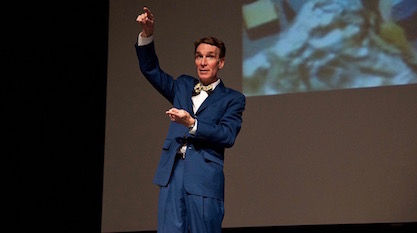 Evolution
Evolution
 Faith & Science
Faith & Science
 News Media
News Media
Bill Nye Insults the World: “Creationists” Have “Small Brains”


David Klinghoffer has identified some disturbing elements in the new Netflix series, Bill Nye Saves the World. Nor are we alone in criticizing the program. One news story observes that “Nye’s new Netflix show is being torn apart.” But there’s quite a bit more to be said about problems with the series.
In Episode 5, titled “The Original Martian Invasion,” Nye starts by promoting the primordial soup hypothesis and says, wrongly, that the early Earth probably had methane and ammonia in its atmosphere. He alludes to Miller-Urey type experiments as supposedly demonstrating that such an atmosphere could produce a primordial soup. All of this is simply false and outdated science.
As we’ve explained before, it’s now thought that the Earth’s early atmosphere didn’t contain methane or ammonia, making Miller-Urey experiments largely irrelevant to generating prebiotic organic molecules. And by “now” we mean at least since the 1990s. It seems Bill Nye needs to update his science on origin-of-life chemistry post 1993, when his original show first aired.
In the same episode, Nye suggests that life came to Earth via what he calls “transpermia,” which is basically panspermia where life arose on Mars and then was transferred to Earth after being blasted into space by meteorite impact. There’s even a silly ditty sung on the show titled “Panpsermia’s How Life Started on Earth,” which proposes that aliens seeded life on Earth.
Though Nye calls this a “hypothesis,” panspermia receives such strong emphasis on the episode that you come away with little doubt that that is the main message they want you to absorb. Indeed, this emphasis reminds us of the way Neil deGrasse Tyson promoted the discredited hypothesis on Cosmos in 2014. In response to Cosmos, we showed that panspermia has many problems, not the least of which is explaining how life could survive in the harsh radiation-filled environment of space or how it could survive the extremely violent, hot, and destructive process of reentry into a new planetary environment. Yet, just like Neil Tyson, Bill Nye informs his viewers about none of these challenges.
In Episode 10, “Saving the World — With Space,” Nye reboots his infamous “speck” speech, denigrating the value of human beings. Here’s exactly what he says:
You’re just this speck. Just this speck. I’m just like the grains of sand on the beach. I’m just this speck. And the Earth really in the cosmic scheme of things is another speck. Which is orbiting the sun — which is a completely unremarkable star. I’m a speck on a speck with a bunch of other specks, orbiting a speck with billions of specks, in the middle of specklessness. I suck. I am nothing.
The point of the episode is to encourage the public to support space travel, which in itself is a completely noble and reasonable goal. But will telling the public that life is meaningless in the “cosmic scheme of things” help accomplish that goal? It’s a good thing his claims are false!
As Klinghoffer mentioned, Bill Nye is big on praising diversity. But when it comes to a diversity of viewpoints on evolution, the façade of broadmindedness drops. In Episode 7 (“Cheat Codes for Reality”), Nye and a guest joke about how, to quote them exactly, “creationists” have “small brains.” The comment gets supportive hoots, hollers, and a big round of applause from the audience.
While the creationist perspective is not our own, it remains true that some 42 percent of the American public believe that God created humans within the last 10,000 years. Way to engage the culture, Bill. Is this what the new Darwinian science communication is supposed to look like? That’s a lot of people to insult and dismiss, including some bright TV producers and writers who, we feel confident in thinking, could put together a smarter and classier presentation of their views than this series does for Bill Nye’s atheism.
Speaking of brains, in Episode 12 (“Designer Babies”), Nye advocates destroying human embryos that carry certain undesirable traits, such as diseases. Nye tries to explain why a lot of people are opposed to this idea. Says Mr. Nye:
For me, the most important idea in life science is evolution. And I claim that what you feel is the result of evolution. Our brains are set up as a result of millennia of selection.
For our part, we claim that if Bill Nye’s beliefs are the result of millennia of unguided and random processes, then there is little reason to take them seriously. For details on why that is the case, see Alvin Plantinga’s excellent argument on self-defeating naturalistic evolutionary explanations for the origin of the human mind.
Photo: Bill Nye, by Will Folsom [CC BY 2.0], via Wikimedia Commons.
